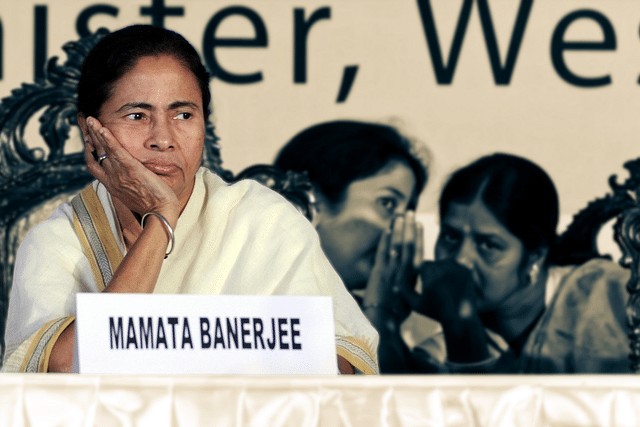
Time For Central Agencies To Hasten Scam Probes In Bengal
Why have the probes into the Saradha Chit Fund scam and other ponzi schemes in Bengal not reached their logical conclusion?
Officials say it is due to the subversive efforts by the accused to make it difficult for the CBI and ED to uncover the truths.
Seasoned administrators say that if the central agencies had taken the Supreme Court into confidence early, efforts to stonewall the probes could have been stymied.
It’s been more than five years since the Central Bureau of Investigation (CBI) started probing the Saradha and Rose Valley scams that defrauded an estimated 30 lakh depositors, mostly poor people, of over Rs 55,000 crore.
The investigations, which resulted in the arrests of senior Trinamool leaders, have raised a lot of political heat and dust and the scams themselves have been major poll issues. But, of late, questions are being raised about the credibility of the CBI probe since it has been dragging on for an inordinately long time.
A number of senior Trinamool leaders have been questioned about their alleged involvement in the scam, the latest being its Rajya Sabha MP Derek O’Brien, who was interrogated for nearly three hours at the central agency’s Kolkata office Friday.
The MP was questioned in his capacity as the publisher of Jago Bangla, the Trinamool mouthpiece that had reportedly received money from the Saradha group of companies.
CBI sources indicated that the editor of the mouthpiece and Bengal education minister, Partha Chatterjee, may also be called in for questioning soon.
The CBI had earlier arrested former Bengal transport minister and senior Trinamnool leader Madan Mitra, Trinamool MPs Sudip Bandopadhyay, Tapas Paul and Srinjoy Bose, a former Director-General of Police of Bengal, Rajat Majumdar (who was close to the Trinamool leadership), and film producer Srikant Mohta (a close aide of Trinamool chief Mamata Banerjee).
The agency has also questioned other Trinamool MPs such as Satabdi Roy, Arpita Ghosh and Ahmad Hassan, Trinamool national secretary Subrata Bakshi and Manik Majumdar (a long-time aide of Mamata Banerjee).
Former Kolkata Police Commissioner Rajeev Kumar is accused by the CBI of destroying and tampering with evidence that could have implicated the top Trinamool leadership in the ponzi scams.
The CBI, along with the Enforcement Directorate (ED), which is also probing some aspects of the scams, would have spent thousands of man-hours by now examining witnesses, accused, informants and documents and gathering a mountain of evidence.
It had several opportunities to interrogate key accused. Saradha boss Sudipto Sen and other functionaries who have been in custody for a long time now have also made crucial confessions, including an explosive one earlier this year, that names the top Trinamool leadership.
Some of the accused have turned approvers and have, reportedly, provided a lot of evidence to the CBI.
However, the CBI is nowhere near filing the final chargesheet.
Top CBI officers associated with the case told Swarajya that given the current pace of investigations, it would take a couple of years more at least to complete the probe.
Substantial cross-examinations of the accused and witnesses still remain, and documents and evidence need to be re-examined based on those interrogations.
The CBI is also keen on making some of the key accused who have given conflicting statements face each other.
Agency officers say that custodial interrogation of Rajeev Kumar, who headed the SIT set up by the state government in April 2013 and is suspected to have destroyed evidence to protect his political bosses (read this), is very essential.
It is true that the state government and the state police have put up many hurdles to derail and delay the investigations and had even made oral complaints to the apex court about this.
The SIT itself, says the CBI, delayed handing over a lot of documents such as pages of diaries to the CBI after the Supreme Court ordered in May 2014 that all the probes into the ponzi scams be handed over to the CBI. Agency officers also say that call records of key accused have been tampered with.
The Mamata Banerjee government, for obvious reasons, raised a hue and cry every time the CBI summoned a Trinamool functionary for cross-examination. The CBI office was blockaded many times and CBI officers heckled and even detained when they had gone to issue summons to police officer Rajeev Kumar earlier this year.
Mamata Banerjee had, infamously, staged a dharna to protest the summons issued to Rajeev Kumar in early February this year.
In fact, the Trinamool chief had been opposing every move of the Union government to thoroughly probe the scam. For instance, she accused the then UPA government of using the ED to target the Trinamool over the Saradha scam and targeted P Chidambaram, the then finance minister.
She accused Chidambaram’s wife of involvement in the scam. However, three years later, Banerjee vociferously protested the CBI raids on Chidambaram’s homes, calling it “political vendetta”.
CBI senior officers says they’ve been working under immense pressure from political leaders. Even state police officers try and put pressure and are not co-operative, they say.
Senior officers also say that the CBI should have documented all the hurdles, threats, intimidation and accusations it has had to face in Bengal and submitted it to the apex court.
They should have sought strong directives to the state government to fully cooperate with the investigation or face the music. That way, they say, the state would have had no alternative but to cooperate.
Since the CBI and ED probes have been continuing for more than five years and seem nowhere near completion, doubts are now being raised about them.
But will the CBI take the Supreme Court into confidence and wind up the investigations?
It is time that the politicians who benefited the most from the scams are put on trial.